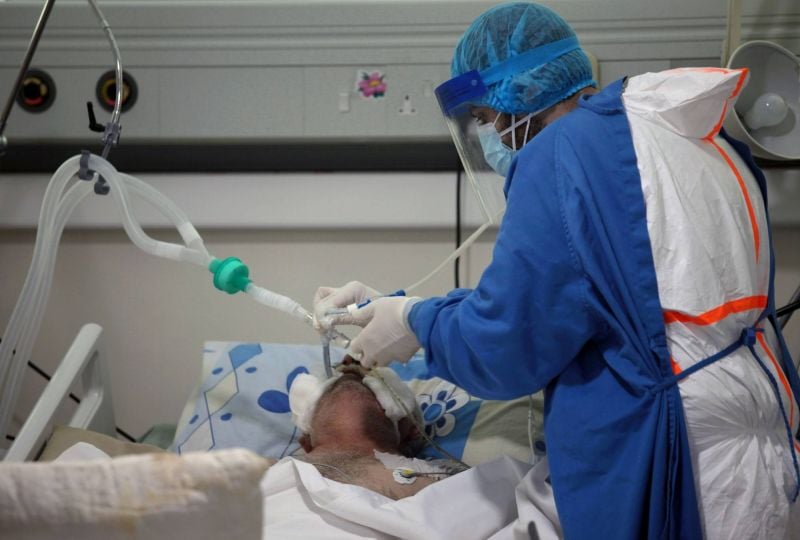
A health worker treats a COVID-19 patient in an intensive care unit at Rafik Hariri University Hospital in Beirut. (Credit: Emilie Madi/Reuters)
BEIRUT — Lebanon recorded 76 COVID-19 deaths Wednesday — another grim new daily record — the same day it unveiled its much-anticipated COVID-19 inoculation program that seeks to cover 70 percent of its population by the end of the year.
Hospitals are rushing to set up injection sites in anticipation of the first shipment of the vaccine.
“We are preparing a team that consists of nurses, pharmacists and doctors,” Ziad El Khoury, the medical director of Hôpital Notre Dame des Secours in Jbeil, told L’Orient Today.
The first doses, expected to arrive on Feb. 14, will go to health care workers, residents above 64 years of age, and those below 65 suffering from underlying health conditions. The staff and residents of nursing homes, who have also been exposed to the pandemic, are being prioritized as well.
“We’re setting up a vaccination site and preparing ourselves for any complications that might arise,” Khoury said after his hospital was selected as one of the 42 facilities across Lebanon to administer the vaccines.
But deaths and disruptions are likely to persist for months as Lebanon confronts the fallout from the virus’ rampant spread over the Christmas and New Year period, and given the low number of vaccine doses that have been confirmed for delivery to the country.
Currently, Lebanon is set to receive 2.1 million doses from pharma giant Pfizer to be distributed throughout the year, meaning that the vast majority of Lebanese will not be inoculated until more doses are secured.
Some 249,000 doses will be administered before the end of March, 350,000 will be given in the second quarter of the year, 800,175 in the third, and 699,750 in the fourth, covering some 1 million residents. Officials have also secured some 2.7 million doses from the World Health Organization’s COVAX platform but haven’t announced when these will be delivered. Talks are also underway to secure additional doses from other companies, such as Europe’s AstraZeneca.
The plan says the country will aim to vaccinate 400 people daily in each inoculation center, with the second phase of the vaccine rollout prioritizing “other vulnerable populations,” including schoolteachers and staff, child care workers, essential workers in high-risk jobs, and remaining health care workers.
“Fortunately, setting up a vaccination center is easier than setting up a coronavirus ward,” Khoury said.
Some 40 kilometers away, Bellevue Medical Center in Mansourieh is also preparing for the arrival of the first vaccine shipment.
“Cross-linkage with the Health Ministry to compartmentalize the database of residents is underway,” ER doctor Samer Saade told L’Orient Today.
The hospital is also setting up a space to house the ultracold freezers needed to store Pfizer’s vaccine at temperatures of 70 degrees below zero. These freezers will be provided by the Health Ministry.
Almost three weeks into a countrywide lockdown that shuttered all nonessential businesses and implemented a 24-hour curfew, the surge in cases in Lebanon has yet to wane.
Today’s numbers brought the total number of cases to 52,578 since the lockdown was put in place, adding further strain on an already depleted health sector. A record 945 patients are currently in ICUs, according to figures from the Health Ministry.
“Our facility is overflowing with [coronavirus] patients, with 10 to 18 people in the emergency room on a daily basis,” Khoury said, adding that human resources at the facility are struggling to cope with the surge.
This was echoed by Saade, who also highlighted another challenge: the loss of medical staff. He said the number of nurses at his hospital has decreased by 25 percent over the past year.
“A lot of them left the country as a result of the economic crisis, while fresh graduates have yet to enter the market,” he explained.
Saade also pointed out a positive sign: a drop in admissions of severe cases, suggesting that those who contract the virus are seeking treatment earlier.
“We’re still disaster mode and people are still in the ER, but the critical load has decreased,” he said.